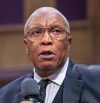Nine people were murdered in a historic African-American church while at a Bible study this week. They were allegedly shot by a young white man who said that he wanted to kill black people. But long before that young man reportedly entered that church, there was said to be evidence that his views about African-Americans were not healthy.
I listened to an interview with a classmate of Dylann Storm Roof who said Roof told racist jokes at his school among his friends, including some African-Americans. No one reportedly thought anything of them, never took him seriously because all assumed he was only joking.
I grew up in a time in this country when it was not uncommon for black people to be referred to using the “N” word. I heard the word often. I was called that word on numerous occasions by whites when I ventured outside of the all-black Georgetown neighborhood of Jackson, Miss. I understood its meaning. And I understood that those using the word knew full well what they were doing. So if Roof used the word or told racist jokes even in the presence of his African-American classmates and did so consistently, he must have felt comfortable. And he would have felt comfortable if no one said anything or challenged him.
Why would his peers have allowed this? Regardless, this kind of behavior is not the exception. We could pass this off as the actions of a misguided and errant young man. But this is not the exception as evidenced by the barrage of ugly words that flooded social media after it was announced that President Barack Obama had opened a Twitter account. Some believe it is within their rights to spout venom because the Constitution protects free speech. They are comfortable and they believe the Constitution protects their comfort.
People who tell racist jokes do so because they think they are harmless, even innocent, but they are never harmless and they are never innocent. There is a lesson here for everyone. It goes to our refusal to stop being comfortable with hearing racist language spoken in our presence. We must find the courage to say this is not acceptable even if those who are using the language or telling the racist jokes are members of our own family.
There is an old adage that says, “Sticks and stones may break my bones, but words can never hurt me.” It is an adage that simply is not true. Words can hurt us deeply and words born out of anger and hatred can push people to commit murder. Jesus makes this point in a profound way in Matthew 5:21-22 where he said, “You have heard that it was said to those of ancient times, ‘You shall not murder’; and ‘whoever murders shall be liable to judgment.’ But I say to you that if you are angry with a brother or sister, you shall be liable to judgment.”
I think Jesus said this because he was acutely aware of the power of anger and the power of hatred. Before the gun was fired in Emanuel African Methodist Episcopal Church, murder had already been committed. It started in the head and was consuming. It led to a poisoned heart, so picking up the gun was easy. The Rev. Albert Starr said to me in the aftermath of the murders at the church this has to push us to have some real and deep conversations about racism that are beyond just sound bites. He is absolutely right. But those kinds of conversations will require a courageous toughness because this is painful stuff. We have just witnessed what deadly consequences can occur when we keep pretending nothing is really wrong.
Dr. Martin Luther King Jr. eulogized three of the four girls killed in the bombing of the 16th Street Baptist Church in Birmingham, Ala., in 1963. He said in part that their deaths told us, “We must be concerned not merely about who murdered these young girls … , but equally we must be concerned about the system, the way of life and the philosophy which produced the murderers.”
We’ve got work to do. I hope and pray that we will have the courage to stop being silent and comfortable when evil is spoken.





